Ants are a notorious nuisance that can quickly turn a peaceful home into a battleground few ants. Their tiny size and relentless nature make them formidable opponents when it comes to invading our living spaces. Ant infestations are a common problem faced by homeowners all around the world.
From pesky little sugar ants to aggressive fire ants, these insects can infiltrate our pantries, gardens, and even our bedrooms. When faced with an unwelcome army of ants marching through their homes, people often search for effective solutions to get rid of them.
While there are various methods available, one potential solution that has gained attention is the use of bleach. Known for its disinfectant properties and ability to both kill bacteria and germs, bleach has become an enticing option for those desperate to reclaim their territory from these tenacious pests.
Brief overview of the common problem of ant infestations
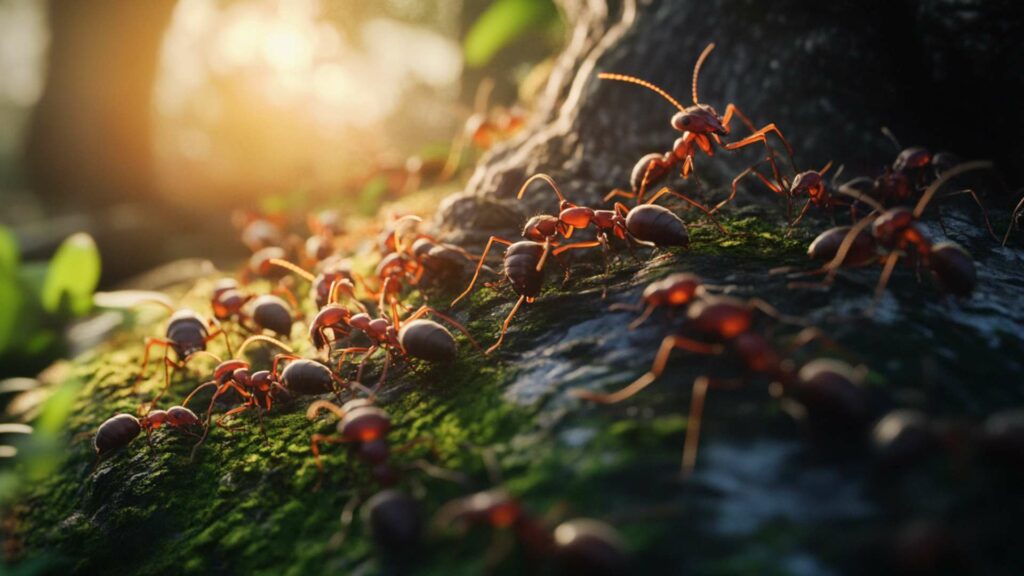
Ant infestations can be frustrating and overwhelming. These social insects live in colonies that can consist of thousands or even millions of individuals working together like a well-oiled machine.
They thrive on finding sources of food and water in our homes, leading them to invade our kitchens, trash cans, or any place where they sniff out potential sustenance. The sight of tiny trails formed by these industrious creatures can be alarming.
Ants leave behind pheromone trails as they travel back and forth from their nests to gather food or explore new territories. These invisible highways guide other members of the colony towards valuable resources, resulting in more and more ants swarming into your living space.
Introduction to the use of bleach as a potential solution
In the battle against ant infestations, people have turned to numerous remedies over time. One intriguing option is using bleach as an ant killer due to its potent properties as a disinfecting agent. Bleach contains chlorine compounds that are harmful to many insects, including ants.
Its ability to disrupt their internal body functions and cause damage makes it an appealing choice for those seeking a swift and effective solution. Using bleach to kill ants involves creating a mixture of bleach and water, which is then sprayed or applied directly onto areas where the ants are active.
The aim is to eliminate these troublesome pests on contact and potentially eradicate the entire colony. However, while bleach may seem like a simple and readily available solution, it’s important to understand its limitations and potential drawbacks before relying solely on this chemical in our battle against ants.
Understanding ants and their behavior
Ants: Tiny creatures, mighty colonies
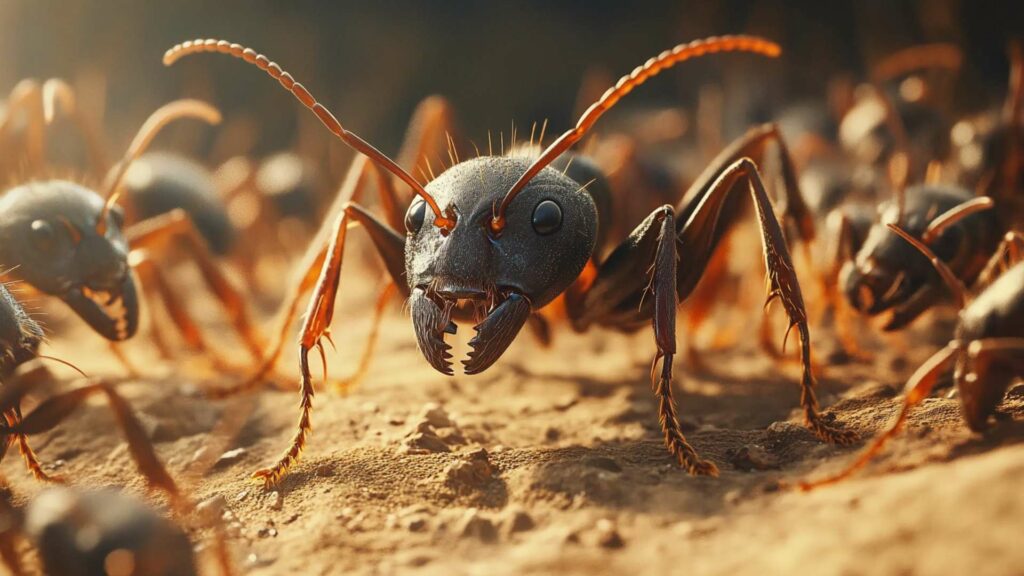
Ants, those minuscule marvels of nature, have managed to establish themselves as formidable social insects. With over 12,000 known species worldwide, ants have evolved an incredible array of habits and behaviors to survive and thrive in various environments.
These industrious insects are known for their remarkable ability to form highly organized colonies that can range from a few hundred individuals to several million. Understanding the behavior of ants is crucial when it comes to effectively dealing with an ant problem.
The diverse world of ant species
When it comes to ants, it’s not just a case of “one size fits all.” The world of ant species is incredibly diverse and fascinating. From the notorious fire ants with their painful stings to the elusive carpenter ants that cause structural damage, each species has its own unique traits and habits.
Some ants, like the black garden ant (Lasius niger), prefer nesting outdoors but will gladly march into your home in search of food. Others, such as Argentine ants (Linepithema humile), establish massive supercolonies spanning vast areas.
Communication and colony establishment
Ants are masters of communication, relying on scent trails left by pheromones to coordinate their activities effectively. When an individual scout discovers a rich food source or a potential new nest site, it will leave behind a trail for its fellow workers to follow.
This remarkable communication system allows entire armies of ants marching in perfect unison towards a common goal. Establishing colonies involves intricate processes as well.
A queen ant lays eggs that hatch into larvae and eventually pupate into adult workers who care for the colony’s needs. Over time, specialized castes develop within the colony – from fierce soldier ants with strong mandibles for defense to diligent foragers that gather food.
Understanding these communication and colony establishment processes is vital for finding effective solutions to deal with ant infestations. By delving into the world of ants and comprehending their behavior, we can better equip ourselves to tackle the challenges they present.
Armed with this knowledge, we can explore potential methods like using bleach to kill ants or seek alternative approaches like essential oils or baiting. However, before we dive into those options, it is important to assess the effectiveness of bleach on ants and consider any potential drawbacks or limitations it may have.
The Effectiveness of Bleach on Ants
A Potent Disinfectant with Untapped Potential
When it comes to battling your house against pesky ant infestations, reaching for that trusty bottle of bleach might seem like an unconventional solution. However, this powerhouse disinfectant has properties that make it a potential combatant against these persistent insects.
Bleach is renowned for its ability to kill a wide range of bacteria, viruses, and fungi, making it a formidable foe for any insect seeking to invade your living space. But can it truly stand up to the resilient nature of ants?
A Lethal Encounter: Bleach vs. Ants
Upon contact with bleach, ants face a formidable enemy that disrupts their physiology and ultimately leads to their demise. The chemical composition of bleach causes severe damage to the exoskeleton of ants by corroding its protective layer and exposing them to dehydration. Additionally, the powerful oxidizing agents present in bleach interfere with essential physiological processes within the ant’s body. When an ant comes into direct contact with bleach, be it through spraying or surface treatment, the corrosive action begins almost immediately. The exoskeleton starts deteriorating as the bleach penetrates through small cracks and crevices in their armor-like exterior. As a result, they become more vulnerable to moisture loss and inevitable death.
Shutting Down Colonies: A Multi-Faceted Approach
While bleach can indeed be effective in eliminating individual ants upon contact, eradicating an entire colony requires additional measures. Ants are social insects that live in intricate societies centered around their queen and her brood; eliminating the queen is crucial for long-term success.
To effectively tackle an infestation at its core, combining the use of bleach with other methods can significantly enhance effectiveness. For instance, strategically targeting ant entry points with bleach-infused solutions can disrupt their trails and deter further exploration.
Additionally, employing natural alternatives like essential oils or diatomaceous earth in conjunction with bleach can create a multi-faceted approach that addresses the ant infestation from various angles. Ultimately, bleach can serve as an effective ant killer when used judiciously and in combination with complementary methods.
However, it is essential to recognize that while bleach may eliminate individual ants and disrupt their trails, it may not always penetrate deep enough into the colony to reach the queen. In such cases, alternative approaches like using boiling water or boric acid-based baits ant bait might be required for comprehensive eradication.
Factors influencing the effectiveness of bleach on ants
Discussion on ant species’ susceptibility to bleach
When it comes to using bleach as an ant killer, it’s important to consider that not all ant species react in the same way. Some ants may be more susceptible to the effects of bleach, while others may exhibit a higher resistance.
For instance, smaller ants like sugar ants or pavement ants are generally more responsive to bleach due to their delicate exoskeletons and smaller size. On the other hand, larger and tougher ant species like carpenter ants or fire ants might require a stronger concentration or repeated treatments for the bleach to have a significant impact.
It’s also worth noting that different colonies within a single ant species can display varying levels of vulnerability towards bleach. Factors such as genetics, exposure to certain substances, and environmental conditions can influence an ant colony’s resistance.
Therefore, even if you find that one group of ants is easily affected by bleach, there is still a possibility that another ant colony, from the same species might not be as affected. This highlights the complexity of dealing with multiple ant colonies in various stages of infestation when using bleach as an eradication method.
Consideration of different concentrations and types of bleach
When contemplating using bleach to kill ants, it is crucial to understand that concentration matters. While undiluted household bleach can certainly be effective against pests, employing highly concentrated solutions might not always be necessary or safe for indoor use due to potential harm it can cause humans and pets.
A recommended approach is diluting household chlorine-based bleaches with water before applying them as an ant killer solution. A 1:10 ratio (one part bleach mixed with ten parts water) is often sufficient for most situations involving common household ants.
This diluted solution strikes a balance between effectiveness against pests and minimizing any harmful effects on humans or animals. Furthermore, there are alternative types of bleach that can be used as well.
Oxygen bleach, for instance, is a safer option that can still effectively kill ants without the potential harmful effects of chlorine-based bleaches. It’s important to carefully read the labels and follow instructions when selecting and using any type of bleach to kill ants, ensuring the safety of both your household and the environment.
By understanding ant species’ susceptibility to bleach and considering different concentrations and types of bleach, you can maximize your chances of success in using this method as an ant killer. Remember to always prioritize safety by wearing gloves when handling bleach and keeping windows open or ensuring proper ventilation during the application process.
Potential drawbacks and limitations when using bleach against ants
Not a universal solution: Why some ant colonies may not be affected by bleach
While bleach can be an effective ant killer, it is important to note that its efficacy may vary depending on the type of ant species and the size of the infestation. Some ant colonies have developed resistance to certain chemicals, including bleach, making it less effective in eradicating them entirely. Additionally, certain ant species have evolved mechanisms to detect and avoid harmful substances like bleach, allowing them to thrive even in its presence.
One reason why some ants may not be affected by bleach is their ability to detect and avoid chemical barriers. Ants rely heavily on their sense of smell to communicate with each other other ants and navigate their surroundings.
When they come into contact with strong-smelling substances like bleach, they can quickly recognize it as a potential threat and alter their foraging patterns accordingly. This means that while bleach may deter ants from entering certain areas initially, it might not completely eliminate the colony since they can find alternative routes or adapt their behavior.
Potential harm to humans, pets, or the environment
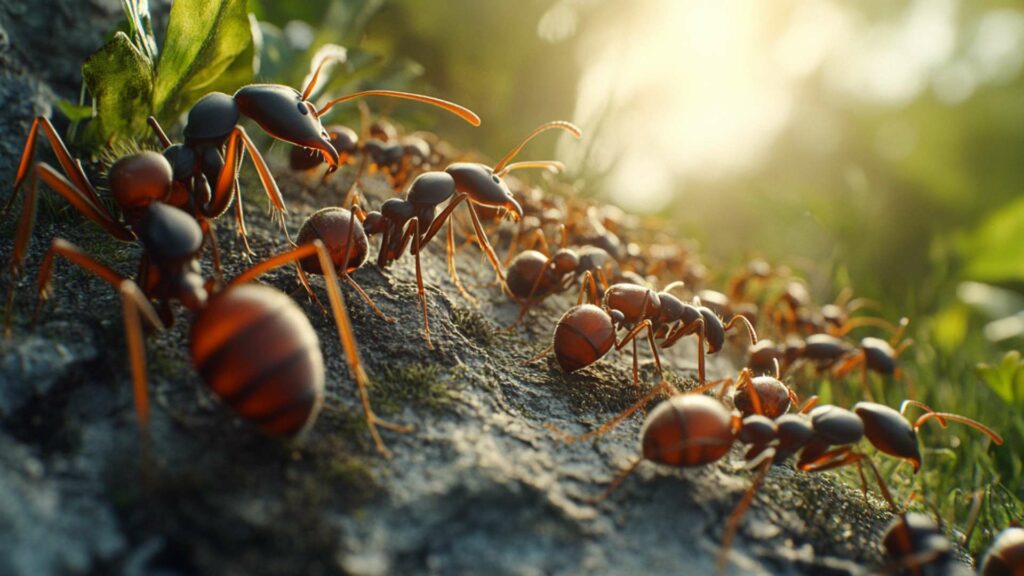
While using bleach as an ant killer may seem appealing due to its effectiveness in eliminating these pesky insects, one must exercise caution due to potential risks associated with its use. Bleach is a chemical compound containing chlorine that can be harmful if mishandled or used in excess concentrations.
When using bleach indoors or near food preparation areas, there is a risk of contaminating surfaces or food with residual chemicals. Moreover, inhaling or coming into direct contact with concentrated bleach can irritate the respiratory system and skin.
Thus, precautions such as wearing gloves and ensuring proper ventilation should always be taken when working with this strong disinfectant. It is also crucial to consider the impact on pets and the environment when using bleach as an ant killer.
Pets, particularly cats and dogs, are sensitive to strong smells and other chemicals. Ingesting or coming into contact with bleach can lead to various health issues for them.
Furthermore, the runoff from bleach can find its way into waterways, potentially harming aquatic life and disrupting the delicate balance of ecosystems. Therefore, it is essential to be mindful of the potential harm that bleach can cause and explore alternative ant control methods that are safer for both humans and the environment.
While using bleach as an ant killer may appear as a straightforward solution to combat infestations, there are potential drawbacks and limitations that need to be considered. Not all ant colonies will be affected equally by bleach due to their ability to avoid chemical barriers or develop resistance over time.
Additionally, the harmful effects of bleach on humans, pets, and the environment should not be overlooked. Exploring alternative methods or seeking professional assistance is advisable in situations where bleach may not be the most suitable or safest option for eradicating ants effectively while minimizing potential risks.
Alternative methods for controlling ant infestations without using bleach
When faced with ant infestations, there are alternative methods available that can effectively control these pesky insects without the need for bleach. Let’s explore two such options: natural remedies and mechanical prevention methods.
Natural Remedies
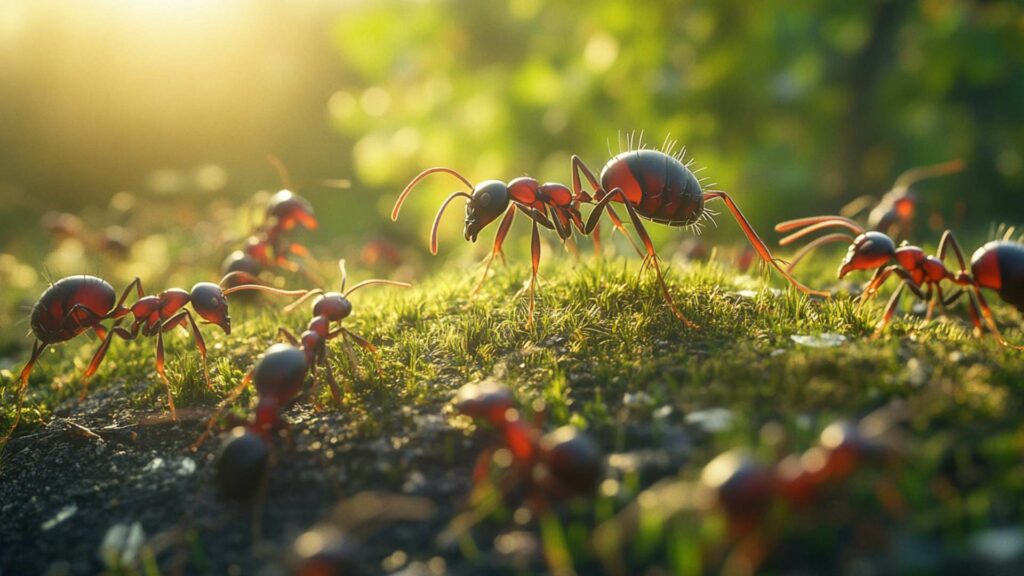
One popular natural remedy for repelling ants is vinegar. Its strong smell disrupts their pheromone trails, which they use to communicate and locate food sources. Simply mix equal parts of vinegar and water in a spray bottle and apply it along ant trails or areas where you suspect they may enter your home.
Essential oils, such as peppermint oil, tea tree oil, or citrus-based oils, also work wonders in deterring ants. These oils have strong scents that ants dislike and can disrupt their communication systems.
Dilute a few drops of your chosen essential oil in water and spray it around entry points or areas prone to infestations. Diatomaceous earth is another effective natural option that works by dehydrating ants’ exoskeletons upon contact.
It consists of finely ground fossils and feels like powder to us but has sharp edges at the microscopic level that damage insects’ delicate bodies. Sprinkle diatomaceous earth around ant trails or areas where you’ve observed their presence to deter them effectively.
Mechanical Prevention Methods
In addition to natural remedies, implementing mechanical prevention methods can also help keep ants at bay. Start by identifying and sealing off entry points through which ants may be gaining access into your home. Common entry points include gaps around windows and doors, cracks in walls or foundations, or openings around utility pipes.
Another crucial step is to remove potential food sources that attract ants. Ensure that all food items are stored in airtight containers, clean up spills promptly, and wipe down countertops regularly.
Additionally, keep your garbage tightly sealed and dispose of it regularly to avoid providing ants with an easy meal. By combining these natural remedies and mechanical prevention methods, you can significantly reduce ant infestations without relying on bleach or harmful chemicals.
Conclusion
While bleach can be effective in killing ants upon contact due to its high surface tension and disinfecting properties, there are alternative methods available for controlling ant infestations without using bleach. Natural remedies like vinegar, essential oils, and diatomaceous earth offer non-toxic ways to deter ants by disrupting their pheromone trails or damaging their exoskeletons. Mechanical prevention methods such as sealing entry points and removing food sources also play a crucial role in preventing ant invasions.
It is important to remember that different ant species may respond differently to these alternative methods, so it may require some trial and error to find the most effective solution for your specific situation. Furthermore, taking precautionary measures like practicing good hygiene and regular cleaning routines can help minimize the risk of future infestations.
By adopting these non-chemical approaches for pest control, not only do we create a safer living environment free from harmful substances but also contribute towards the overall well-being of our ecosystem. So let’s embrace these natural alternatives with optimism as we work towards finding sustainable solutions in our battle against unwanted pests!
Dissuade Ants with D-Termination: Las Vegas’ Leading Pest Control Service!
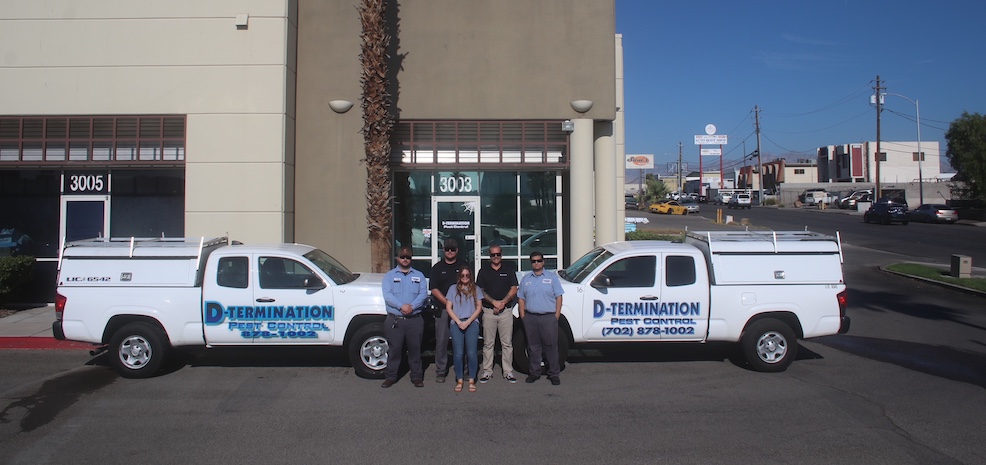
If you’re dealing with ant concerns, D-Termination is your answer. Our skilled team excels at deterring ants, rejuvenating cleanliness, and preserving the integrity of your area. Bid farewell to ants—opt for D-Termination for effective pest control today!
Reach out to us at 702-919-6310 or visit dtermination.com to schedule your ant control service and regain your space from these unwanted pests.
Frequently Asked Questions:
Bleach can kill ants upon contact, but it’s not a practical ant control method.
Bleach is not a reliable solution for keeping ants away.
Commercial ant baits or insecticides can eliminate ants more effectively and quickly.
Bleach can disrupt ant trails temporarily, but it’s not a long-term solution.







